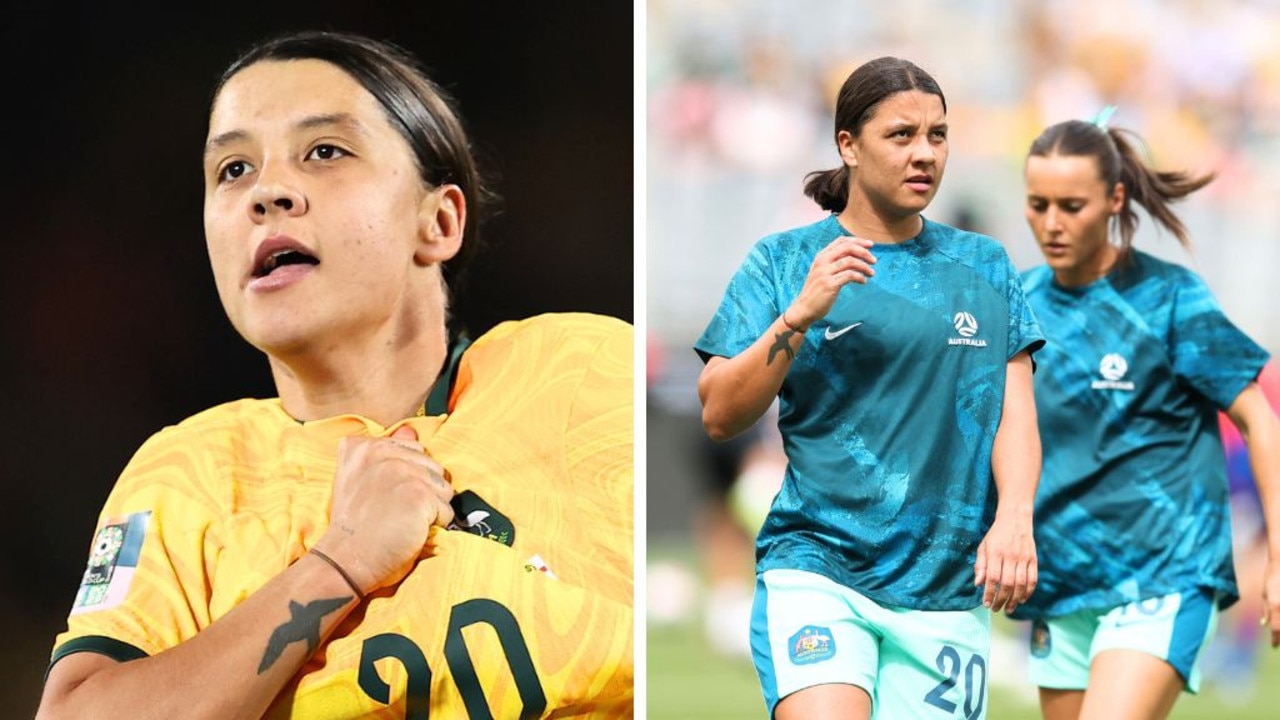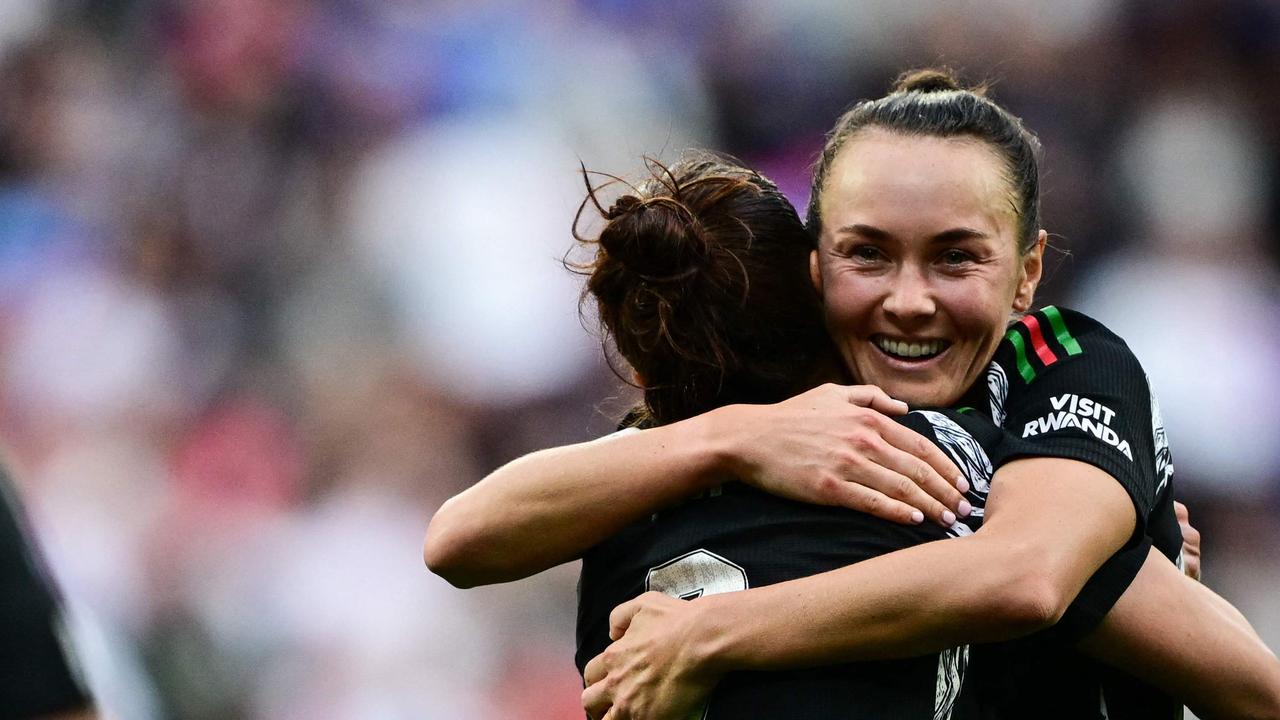FIFA Women’s World Cup: Inside Julie Dolan’s and the Matildas’ slow rise to stardom
The Matildas used to sell lamingtons and wash cars to fund their football fantasy. The pioneering side’s inaugural captain Julie Dolan opens up to ADAM PEACOCK about the slow march to progress.

Women's Football
Don't miss out on the headlines from Women's Football. Followed categories will be added to My News.
Picture this, for a moment, and stretch your imagination as far as it can go.
It is the week before the Matildas’ World Cup opener against Ireland. Sam Kerr is in Auburn, western Sydney, close to the Olympic Stadium where the game will be held.
Kerr is winding her way through the streets, dropping promotional material into letterboxes.
“Thursday! July 20! Australia v Ireland. World Cup! Be there!” the pamphlet reads.
Implausible, impossible. Wouldn’t happen.
But that was footballing life – in another lifetime, another universe to the world of rampant professionalism, worldwide documentaries and flashy commercials pumping us all up for this month-long extravaganza Kerr and co are about to front.
In 1979, days before the Matildas’ first ever ‘official’ international against New Zealand, Julie Dolan was pounding the pavement in southern Sydney.

“I remember walking around the local area, where I lived, putting pamphlets into letterboxes,” Dolan recalls.
“Just to let some people know there was an international match on.”
Dolan, one of many Matildas matriarchs, smiles a lot.
She loves the game as much as she did when only family and close friends paid attention, and beams when she realises what has become of the team she helped build.
On June 25, with a number of her former teammates, Dolan got up before dawn and walked across the Sydney Harbour Bridge to celebrate the impending World Cup.
“All of a sudden we’re on the Harbour Bridge and it’s closed because of women’s football!!” Dolan says of the Matildas 40-year overnight success.
“Now that’s a farrrr cry from what we experienced.”
Dolan is listed as cap No.1 on the Matildas honour roll. She was captain for that first ‘official’ international against the Kiwis, played in front of not many, at Seymour Shaw Park in Cronulla on October 6, 1979.
The latest debutant, late blooming defender Clare Hunt, is cap No.224.
Every player in between, says Dolan, has contributed to the step-by-step growth of the Matildas. It was slow and painful at the very start. They had to fund themselves.
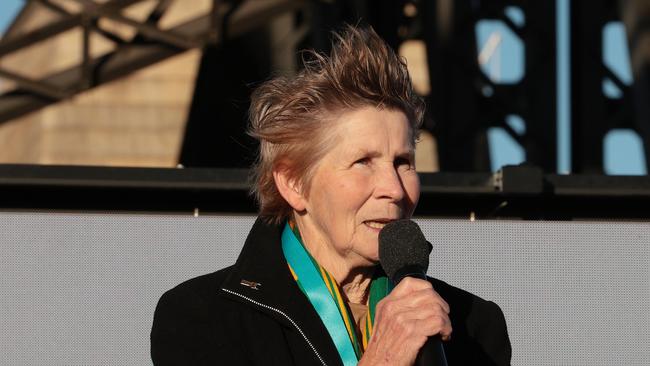
“Nobody knew women played football when we asked for any money,” Dolan recalls.
“It was not met with much enthusiasm.
“We sold lamingtons to get to overseas tournaments. Washed cars. We had casino nights out of the garage. Poker, roulette.
“My mum, she came up with the most inventive ways.
“She came up with the idea of Melbourne Cup trifecta raffles. Research how many different combos. 2034! Write them all out, get businesses to sell them.
“Everyone wants a bet on the nags! The winner got $1000, and we’d make $1000. Gotta take what you can get.”
Other fundraising methods fell flat.
“We used to stand on the side of the road with buckets, flag people down like the Salvos. But no-one would stop,” Dolan recalls.
“So we’d put someone in a car at the bottom of the road to slow the traffic right down. Like the safety car in the F1s!
“We’d run along the line of traffic with our buckets. But that wasn’t very lucrative.
“You just did it, because you loved it. And no one else was coming to the party.”
All of it was necessary to get the team together for training camps, then to travel.
The various football federations back then were skint, governments would give a few hundred bucks per player, but the rest had to come from players themselves to put the Australian women’s team on the map. Or move it around at least.
One of Dolan’s fondest memories is the week spent in camp before the 1988 ‘pilot’ World Cup in China, a tournament put on by FIFA, who until then were reluctant to commit to a female world championship like the blokes had played since 1930.
The Matildas gathered in Camden, far west Sydney, for a week-long camp which felt like a luxury.
“Fan-tastic!!” Dolan says of that week.
“Training all day, trying to establish patterns of play with women who hadn’t played together. They are some of my most cherished memories out of those camps. Just a fabulous time.”
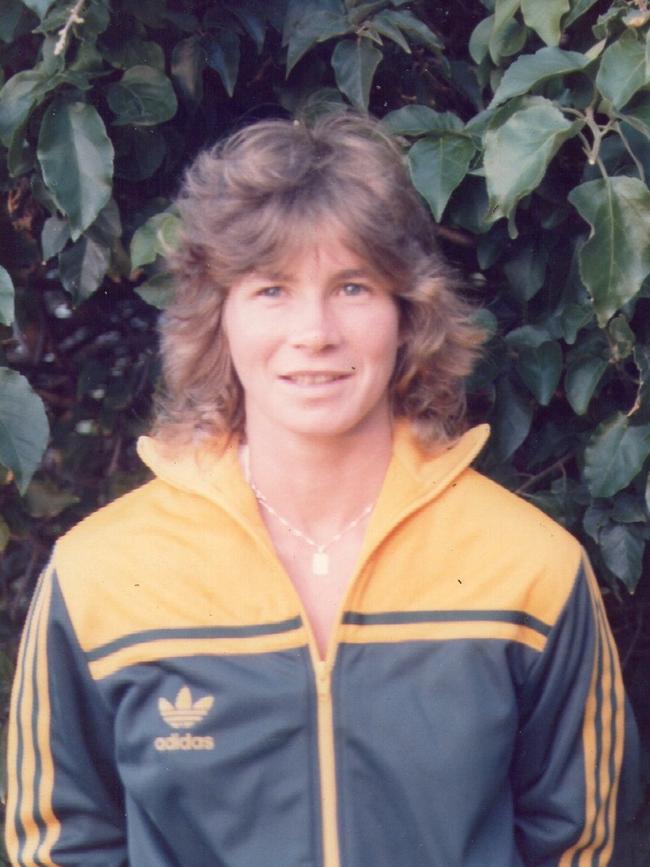
As detailed in Fiona Crawford‘s new book ‘The Matilda Effect’, taking part in tours like the ‘pilot’ World Cup meant players had to beg for time off work or in Dolan’s case, go to extremes.
“I resigned from a lot of jobs. Couldn’t get leave,” Dolan says.
“When I finished (in 1988) I looked around, all I had was a pair of old boots. Just had nothing. There was an inability to accumulate funds.”
Worth it?
“Oh absolutely,” she laughs.
All of this is extremely relevant to the fabric of the current Matildas.
Sure, their preparation has been spent in the lap of luxury; two weeks on the Gold Coast, another fortnight in Melbourne at the new ‘Home of the Matildas’. Everything is catered for.
But even this current group of stars has had to scrap for what is fair.
In 2015, the squad went on strike after a pay dispute with Football Federation Australia (now Football Australia) and won.
Such desire spills onto the pitch, evident in wins like the Brazil comeback at the 2019 World Cup. Down 2-0, facing an embarrassing elimination, the Matildas stormed back to win 3-2.
And the 2021 Tokyo Olympics, making the medal round for the first time following a 4-3 extra-time win over Great Britain, which was basically the English side that would go on to win a European Championship 12 months later.
The current crop, Dolan says, deserve all the attention and accolades they get, with attitudes toward female athletes now in a different place to when she wore boots.
“We now accept women athletes as talented professionals
“It’s no different to the 70s, where women athletes trained six days out of seven. It’s just now, with society changing, attitudes changing; we can’t be what we can’t see. People are seeing a lot of women’s athletes.
“Without that effort and determination back then, we wouldn’t be where we are today.
“There’s no fame, there’s no fortune, it’s all here,” Dolan says, pointing to her heart.
“Passion. Every one of us.”
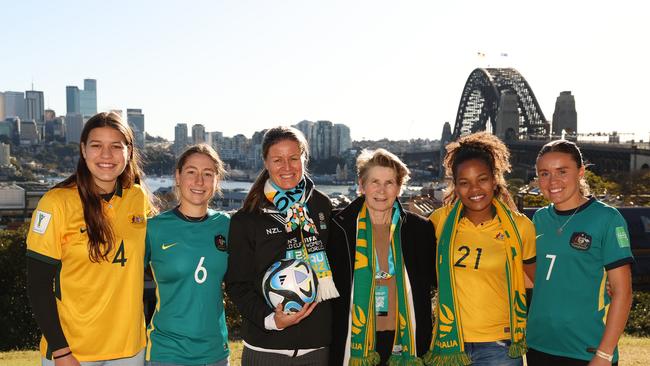
Dolan will be there on opening night against Ireland, customary smile on her face, in wonderment.
“When I’m asked, ‘Would you prefer now, as opposed to then?’ Of course I’d say now,” she says.
“But one can’t happen without the other.
“Am I jealous I’m not involved? No. But, you wouldn’t want to be anywhere else. We’ve come from selling lamingtons to (FIFA forecasting) two billion viewers!”
Dolan pauses for a moment. The grin hasn’t left her face, and one thought in particular won’t leave her mind.
“I still can’t get over Australian women’s football closing the Harbour Bridge!”
“What?! Stop it!”
More Coverage
Originally published as FIFA Women’s World Cup: Inside Julie Dolan’s and the Matildas’ slow rise to stardom




